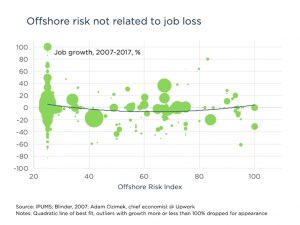15 years later, the numbers are in: The apocalypse never happened.
nytimes.com/2019/09/27/bus…
Some easily offshored jobs shrank. But others grew.

“The lesson is, change is evolutionary, not revolutionary... And because it’s a slow change, it gives people and companies a chance to adjust so we never saw the mass exodus of jobs to India.”
And in @ModeledBehavior’s report: upwork.com/press/economic…





